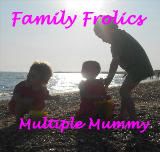(Goblin is 31 months)
I'm guessing most parents of toddlers are in the same boat as me - its that interesting age when you rejoice in your child's development of personality and individuality but at the same time dispair that it takes three times as long to get them dressed because suddenly they have an opinion about what colour socks they want to wear.
Its a time when you have to start deciding what battles you are going to have and where you are going to lay the boundaries so you can co-exist in harmony. Thinking on this issue recently has made me focus on how others parent. And I have spotted a frequently used technique that I don't like, but I realise I can slip into inadvertently. I call it "pass the buck" parenting - when you set a boundary using an external factor as the reason.
I found myself in the swimming pool the other day saying "Goblin don't run or the life guard will tell you off". Now while this is probably true what I should be saying is "Goblin, Walk, don't run, the floor is wet and you might slip". Two seconds later a toddler smacked down right infront of us as if to helpfully illustrate the point.
Hear are three more examples of "pass the buck" parenting I overheard recently:
Its a time when you have to start deciding what battles you are going to have and where you are going to lay the boundaries so you can co-exist in harmony. Thinking on this issue recently has made me focus on how others parent. And I have spotted a frequently used technique that I don't like, but I realise I can slip into inadvertently. I call it "pass the buck" parenting - when you set a boundary using an external factor as the reason.
I found myself in the swimming pool the other day saying "Goblin don't run or the life guard will tell you off". Now while this is probably true what I should be saying is "Goblin, Walk, don't run, the floor is wet and you might slip". Two seconds later a toddler smacked down right infront of us as if to helpfully illustrate the point.
Hear are three more examples of "pass the buck" parenting I overheard recently:
- "Johnny, don't throw gravel or the park ranger will tell you off"
- "Johnny the farmer won't let you ride the tractor without your sun hat on"
- "Johnny if you don't eat your dinner I will tell your father and he will tell you off when he gets home"
I understand the temptation to use this technique (and have done so myself). There is a certain logic that says, if my child won't listen to me and my boundaries I'll tell them its someone else's rule. And also, I don't want to always be seen as the bad guy laying down rules, so I will blame it on someone else.
But here is why I don't like it.
- In some cases its blatantly lying to your child - like telling them they can't go on a tractor ride without a hat on.
- It makes it sound like you'd be OK with the action if the rule wasn't there.
- You fail to give your child the real and sometimes important information about why they need to do or not do something. For example - Don't throw gravel because its dangerous and someone might get hurt.
- And you make someone else out as a baddie. When that person is the child's other parent its simply unfair to the other parent. And when its a stranger, you are suggesting to your child that you will be OK with a complete stranger telling your child off.
So when setting boundaries with Goblin I am trying hard to own them. My logic is that I am less likely to set arbitrary boundaries if I have to give a valid reason for having them. And hopefully if I own my rules and clearly explain their rationale, Goblin is more likely to stick to them.
I should point out that I still think that a valid reason includes "Because that makes me feel uncomfortable, scared or angry". It is easy to forget that your feelings count too, but if you are unhappy with an activity or action your child is doing it is harder to have an open and happy relationship with them. So setting a boundary based on how an action will make you feel is in my opinion completely valid.
How do you set your boundaries, and do you own them?















































